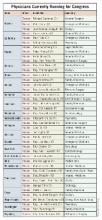Increasingly, it’s not Mr. Smith who goes to Washington – it’s Dr. Smith.
Currently, 20 physicians serve in the 112th Congress: 3 in the Senate and 17 in the House.
This year, 42 doctors are running for a seat in the next Congress; 17 of those are seeking reelection, according to the American Medical Association.
While their reasons for suspending their medical careers in favor of public service vary, many say the steady increase of physician legislators is largely because of the Affordable Care Act.
"This is likely a tectonic shift that has now occurred," said Rep. Michael Burgess (R-Tex.), a gynecologist seeking reelection in that state’s 26th district. "Historically, doctors have been so busy taking care of their patients, raising their families, running their offices that they haven’t paid a lot of attention to politics. But [it’s the] issues surrounding the Affordable Care Act, [that have] driven this."
Dr. John McGoff, an emergency physician running to represent Indiana’s 5th congressional district, said that he believes doctors running for office think the ACA allows for too much government control of health care and threatens the doctor-patient relationship.
"I think most people would like to get back to how it was in the old days, where there was a patient-physician relationship and you didn’t have an insurance company or some type of government entity in between," Dr. McGoff, a Republican, said in an interview.
Emergency physician Randy Jotte wants to represent Missouri’s 2nd congressional district. Dr. Jotte, also a Republican, said that he decided to run to address increasing demands on emergency physicians with limited resources, as well as fighting to repeal the ACA.
The health reform law doesn’t give physicians enough resources to handle a growing number of patients and increasing demand to improve quality and to lower costs, Dr. Jotte said, adding that as health reform took the national stage, the general public became more aware of the issues at stake, and now they’re looking to those who understand the system to help shape it.
"People are much more cognizant of some of the needs and weaknesses in the health care system. ... They look to physicians, both the physicians that are in their offices as well as physicians in Congress and saying ‘how can we do this better.’ "
Most physicians (90%) serving in Congress are Republicans; of the 42 doctors running for Congress this year, 25 are Republicans, 16 are Democrats, and 1 is Libertarian.
Dr. McGoff speculated as to why. "Physicians tend to be somewhat conservative," he said. "Less government, low taxes, individual responsibility, [and] strong national defense; those are the core principles of the Republican Party and I think that resonates well with a lot of physicians."
Rep. Phil Gingrey (R-Ga.), a gynecologist seeking reelection to the House representing Georgia’s 11th district, pointed out that many doctors are also small business owners.
"They’re running these small businesses and they’re seeing the burdens of rules and regulations run amok ... and they’re railing against that ... realizing that a federal government that can give everything can also take away everything from you," he said in an interview.
While Dr. James Buckmaster is a Democrat, he too opposes the ACA. The family physician seeks to represent Kentucky’s 1st district in Congress.
If elected, Dr. Buckmaster said he’d like to see a full repeal and replacement of the health law with a more affordable option that includes fewer regulations on health care professionals. He added that his medical peers are not only passionate about the issues, but are also hard wired to make tough decisions.
"We tend to respond to problems ... we tend to want to interact with them, fix them before they get out of control. I think that’s just the basic way that we’re wired," Dr. Buckmaster said in an interview.
"We’re intelligent people, and we’re confident and rather autonomous; we make decisions each day and we stick by them. Those are the characteristics that we want in our elected officials, and we just aren’t seeing it," he added.
Dr. Evan Saulino, who serves on the board of directors for Doctors for America, noted that research over the last decade has highlighted issues in health care delivery and outcomes. That data, coupled with disappointment with the original model of managed care, fueled discussions about how to improve health care delivery, which motivated doctors to get involved, according to Dr. Saulino, a family physician in Portland, Ore. That involvement has only snowballed with the implementation of health care reform.


